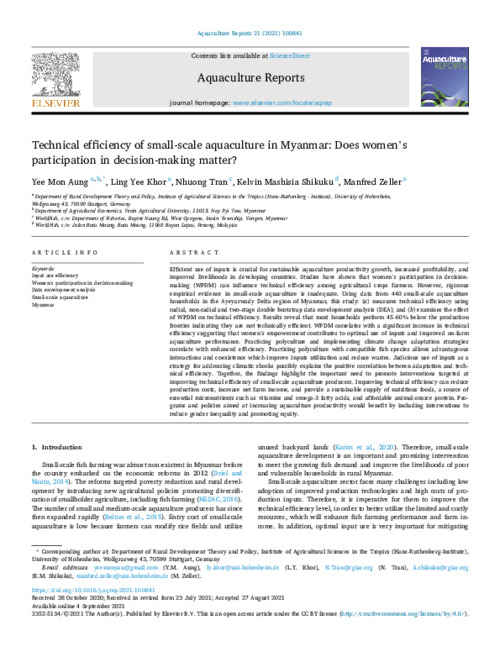Technical efficiency of small-scale aquaculture in Myanmar: Does women’s participation in decision-making matter?

Efficient use of inputs is crucial for sustainable aquaculture productivity growth, increased profitability, and improved livelihoods in developing countries. Studies have shown that women’s participation in decision-making (WPDM) can influence technical efficiency among agricultural crops farmers. However, rigorous empirical evidence in small-scale aquaculture is inadequate. Using data from 440 small-scale aquaculture households in the Ayeyarwady Delta region of Myanmar, this study: (a) measures technical efficiency using radial, non-radial and two-stage double bootstrap data envelopment analysis (DEA); and (b) examines the effect of WPDM on technical efficiency. Results reveal that most households perform 45–60% below the production frontier indicating they are not technically efficient. WPDM correlates with a significant increase in technical efficiency suggesting that women’s empowerment contributes to optimal use of inputs and improved on-farm aquaculture performance. Practicing polyculture and implementing climate change adaptation strategies correlate with enhanced efficiency. Practicing polyculture with compatible fish species allows advantageous interactions and coexistence which improve inputs utilization and reduce wastes. Judicious use of inputs as a strategy for addressing climatic shocks possibly explains the positive correlation between adaptation and technical efficiency. Together, the findings highlight the important need to promote interventions targeted at improving technical efficiency of small-scale aquaculture producers. Improving technical efficiency can reduce production costs, increase net farm income, and provide a sustainable supply of nutritious foods, a source of essential micronutrients such as vitamins and omega-3 fatty acids, and affordable animal-source protein. Programs and policies aimed at increasing aquaculture productivity would benefit by including interventions to reduce gender inequality and promoting equity.
Permalink
Date Available
Type
Publisher
Countries
ISSN
2352-5134
Copyright
CC-BY-4.0
Language